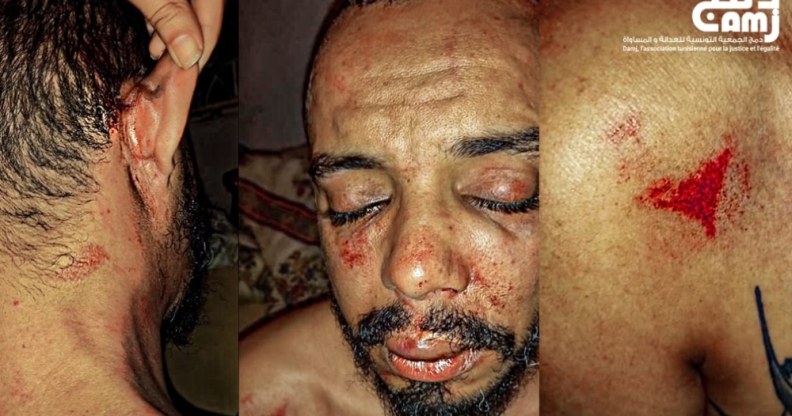Man dressed in police uniform stood on Tunisian activist’s neck in chilling attempt to ‘silence’ him

Badr Baabou, a human rights defender, was battered by cops in Tunisia. (Damj Association for Justice and Equality)
Badr Baabou, a human rights defender, was battered by cops in Tunisia. (Damj Association for Justice and Equality)
A prominent LGBT+ rights activist in Tunisia was allegedly beaten and robbed by two men – one of whom he says was dressed in police uniform.
Badr Baabou – a human rights activist and head of the Tunisian Association for Justice and Equality, or Damj – was attacked by two men in Tunis, the nation’s capital, as he was on his way home on 21 October.
Baabou claimed he was violently beaten, robbed and taunted. The assault left the activist with a concussion and severe injuries to his neck, rib cage, eye and face, a medical report seen by Human Rights Watch (HRW) stated.
The LGBT+ rights activist claims one of his assailants identified himself as “police” before telling a bystander that the attack was “penalty for those who insult the police and file complaints against us”.
Baabou and Damj have filed several complaints against the police on behalf of LGBT+ Tunisians who had been assaulted by law enforcement since the organisation was founded in 2005.
“The assault on Badr Baabou was a dangerous attempt to silence him and other LGBT rights activists,” said Rasha Younes, an LGBT rights researcher at HRW.
Baabou told the Associated Press that the assault was “not the first time that [he] had been attacked by a policeman”, but he said it was shocking nonetheless.
“The attack was horrifying,” Baabou said. “They aimed for my head… at a moment they stood on my neck. This was very symbolic for me as if they wanted to reduce me to silence.”
Although the police has yet to comment on the alleged attack publicly, Baabou’s lawyer, Hammadi Henchiri, told AP it’s understood the force has launched an internal affairs investigation to identify the assailants.
Henchiri claimed that police are “technicians of torture or abuse” who “don’t leave fractures or bruises”.
Tunisian police are targeting LGBT+ activists, human rights group says
Activists have flagged that the recent attack on Baabou indicated an alarming pattern, alleging that police officers are explicitly targeting LGBT+ Tunisians who have forced misconduct cases against officers who harassed or assaulted them.
Rasha Younes, a researcher for HRW, said attacks at the hands of police have been ongoing in Tunisia. She explained that a “climate of criminalisation” had emboldened law enforcement who she said are becoming more “public” and “unabashed” in their mistreatment of LGBT+ people in the country.
“Officers feel empowered to enact whatever form of violence they want, knowing that they will get away with it because the law is on their side,” she said.
After Baabou’s assault and working on two similar cases in recent months, Henchiri told the Associated Press that he had “noticed an unusual severity” in reported attacks.
Earlier this year, Rania Amdouni, a top Tunisian LGBT+ activist, was arrested and sentenced to six months in prison after she pursued a harassment complaint against the police.
A lawyer who witnessed the situation described how “eight police officers” surrounded Amdouni and “repeatedly insulted her”. The lawyer said one officer told Amdouni that she is a “homosexual, you will not win against us, and we will not allow you to defame police officers”.
In February, HRW released a damning report that detailed allegations that LGBT+ rights activists were being repeatedly targeted by Tunisian security forces.
The international NGO said it had interviewed 10 LGBT+ rights activists who reported being abused by law enforcement, five lawyers who represented some of the victims and an activist who fled the country to escape police persecution.
According to HRW, all of the activists interviewed said police threatened them with violence and verbally harassed them. The activists also said they had been arbitrarily arrested, harassed online, physically abused at protests and intimidated by officers.
Baabou told the Associated Press that just “existing as an LGBT person” in Tunisia is a “daily struggle” as people in the community “cannot find their space in society”.

